Abstract
A modified anterogradely perfused rat heart preparation is described in which all the cardiac output passes through the coronary circulation. Such a preparation develops hypertensive aortic pressures. Hypertensive aortic pressures or insulin stimulate the rate of cardiac protein synthesis and inhibit the rate of protein degradation. Aortic pressure and insulin may be important in the regulation of cardiac nitrogen balance in vivo. By abolishing cardiac prostaglandin synthesis with 4-biphenylacetate, we were able to investigate the possible involvement of prostaglandins in the modulation of protein turnover by pressure overload or insulin. There was no evidence of any involvement. However, insulin stimulated and cycloheximide inhibited cardiac prostaglandin synthesis. These findings are consonant with an enzyme involved in prostaglandin synthesis being short-lived and prostaglandin synthesis being rapidly influenced by activators and inhibitors of protein synthesis and degradation.
Full text
PDF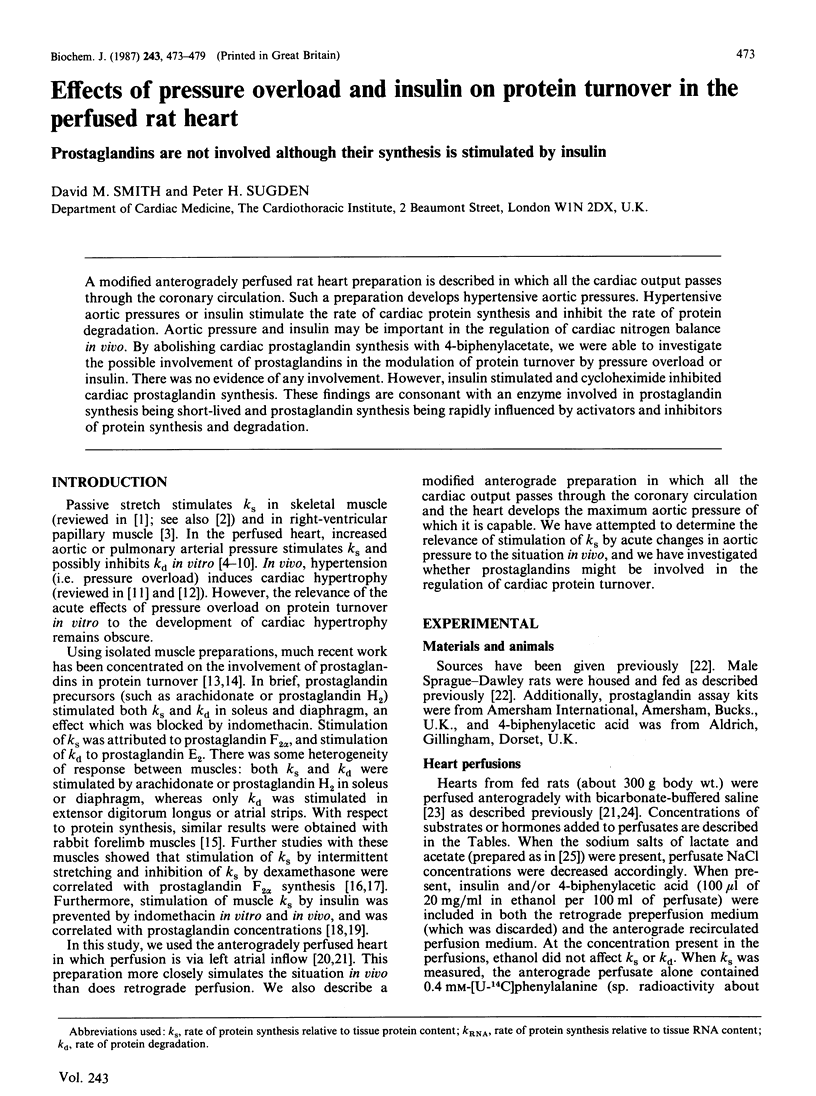
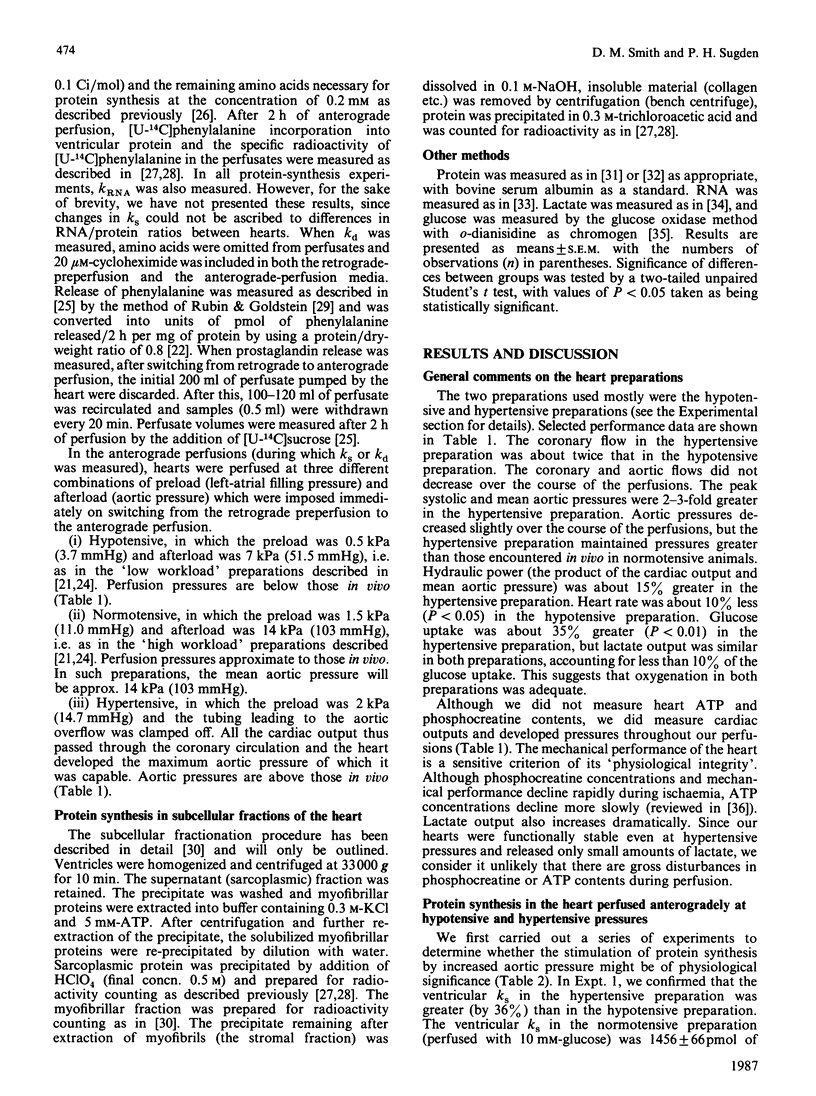
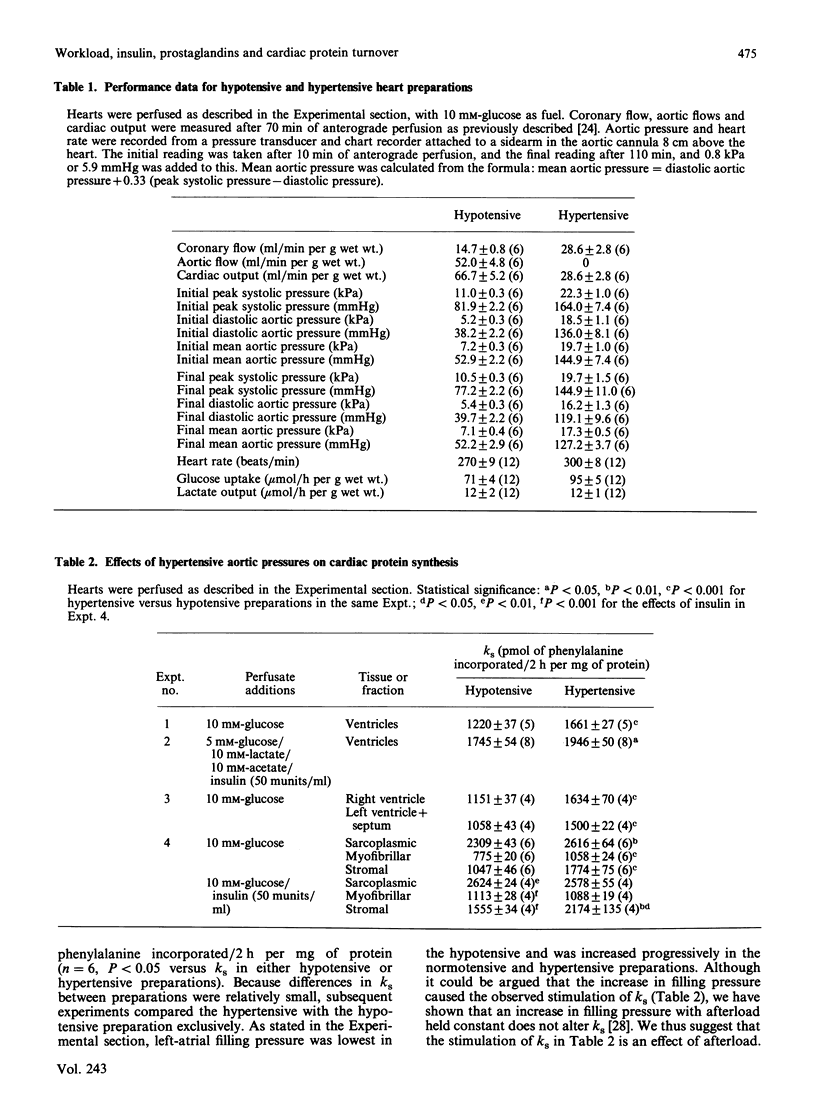
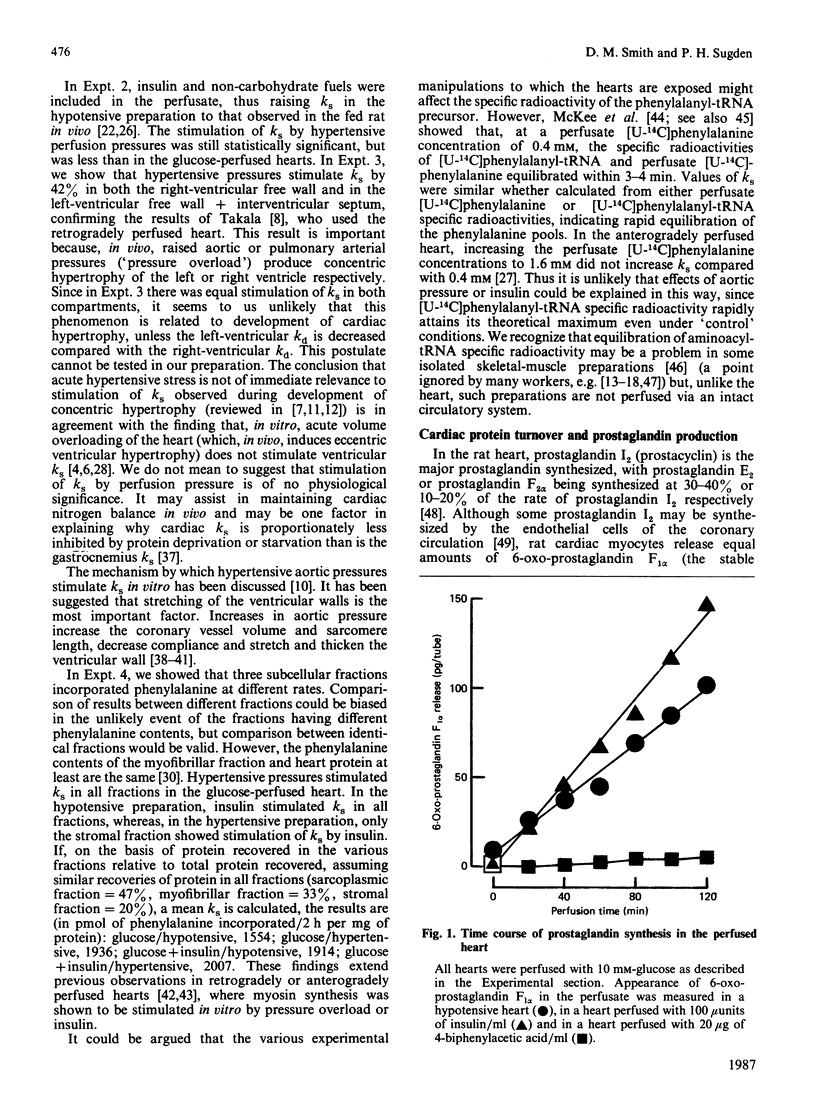
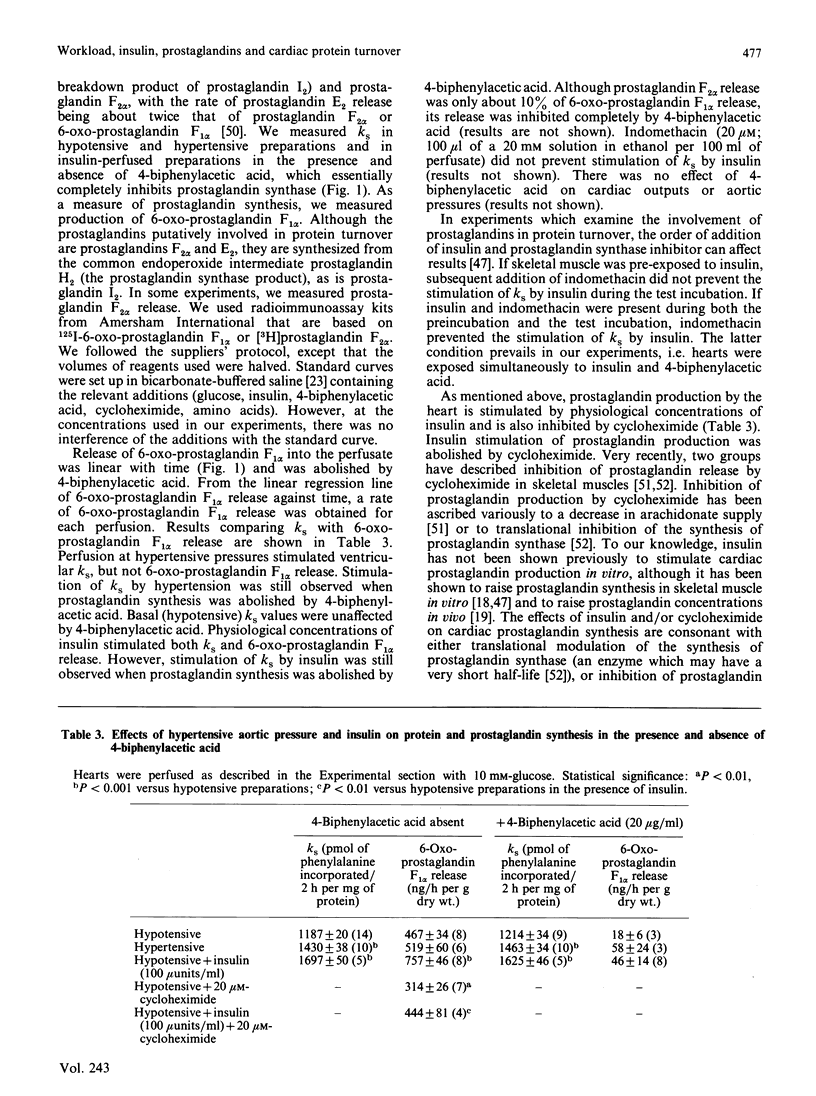
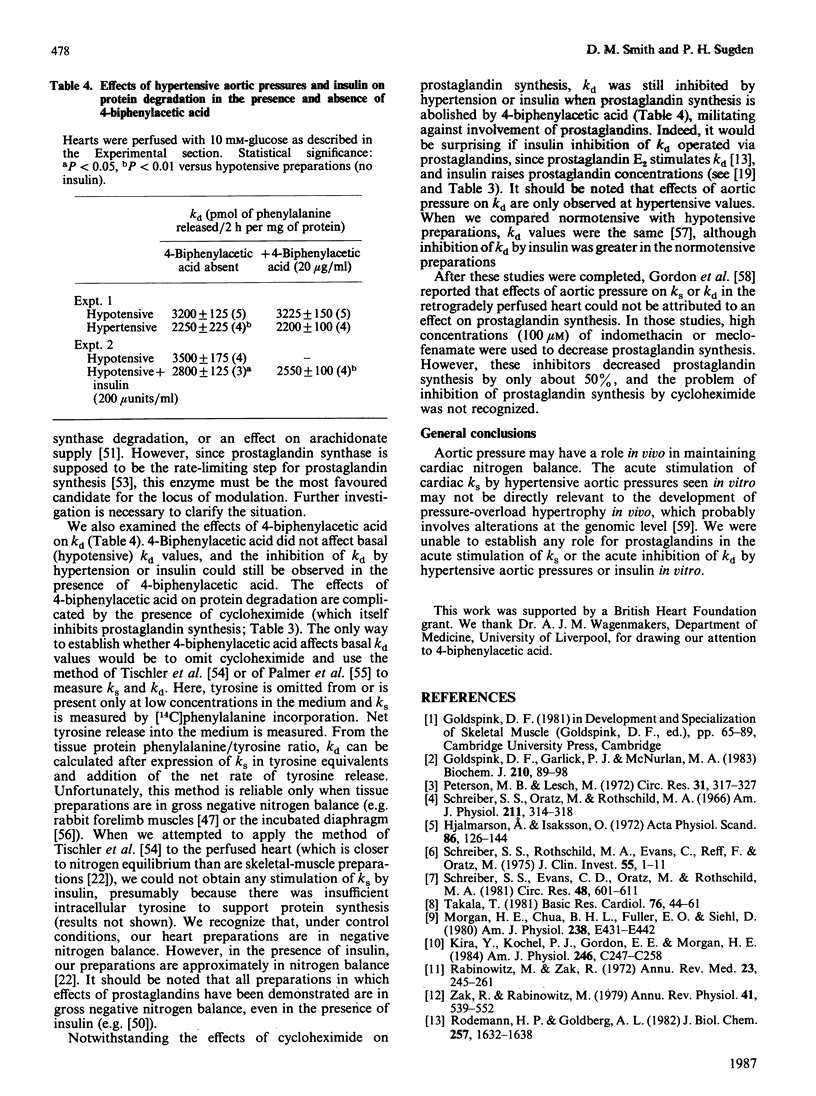
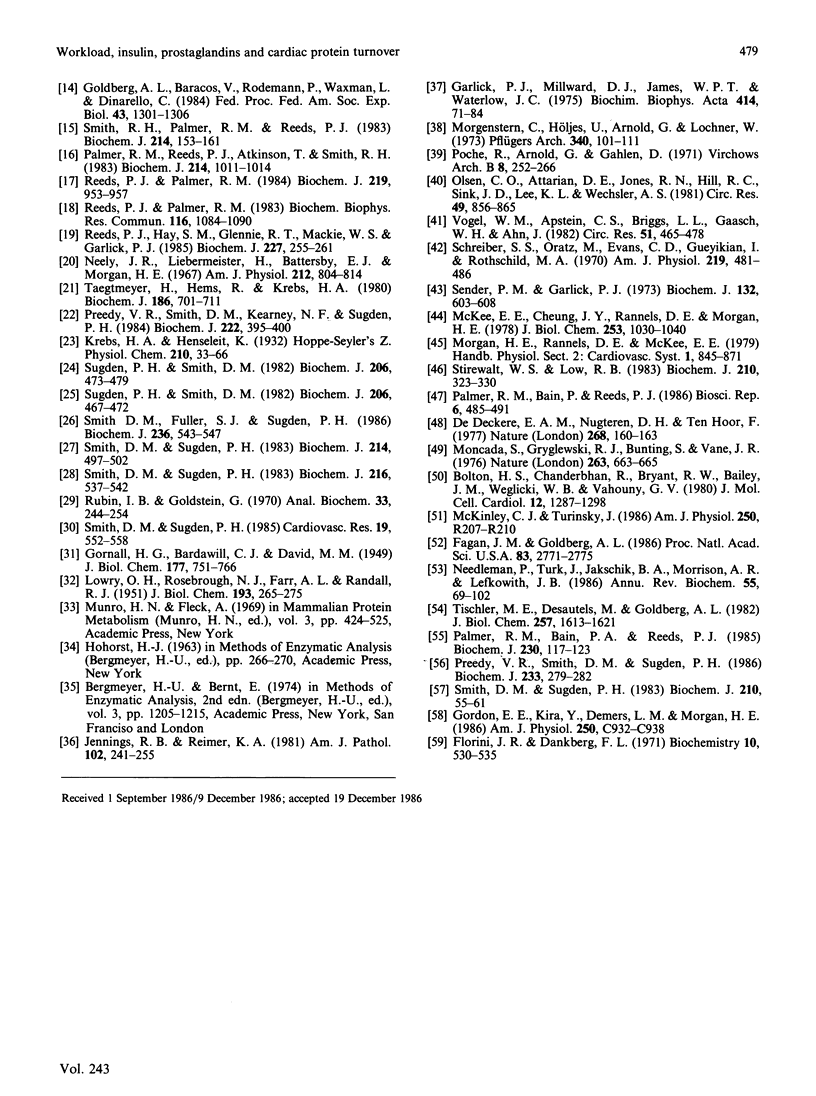
Selected References
These references are in PubMed. This may not be the complete list of references from this article.
- Bolton H. S., Chanderbhan R., Bryant R. W., Bailey J. M., Weglicki W. B., Vahouny G. V. Prostaglandin synthesis by adult heart myocytes. J Mol Cell Cardiol. 1980 Nov;12(11):1287–1298. doi: 10.1016/0022-2828(80)90072-3. [DOI] [PubMed] [Google Scholar]
- Fagan J. M., Goldberg A. L. Inhibitors of protein and RNA synthesis cause a rapid block in prostaglandin production at the prostaglandin synthase step. Proc Natl Acad Sci U S A. 1986 Apr;83(8):2771–2775. doi: 10.1073/pnas.83.8.2771. [DOI] [PMC free article] [PubMed] [Google Scholar]
- Florini J. R., Dankberg F. L. Changes in ribonucleic acid and protein synthesis during induced cardiac hypertrophy. Biochemistry. 1971 Feb 2;10(3):530–535. doi: 10.1021/bi00779a028. [DOI] [PubMed] [Google Scholar]
- Garlick P. J., Millward D. J., James W. P., Waterlow J. C. The effect of protein deprivation and starvation on the rate of protein synthesis in tissues of the rat. Biochim Biophys Acta. 1975 Nov 18;414(1):71–84. doi: 10.1016/0005-2787(75)90126-4. [DOI] [PubMed] [Google Scholar]
- Goldberg A. L., Baracos V., Rodemann P., Waxman L., Dinarello C. Control of protein degradation in muscle by prostaglandins, Ca2+, and leukocytic pyrogen (interleukin 1). Fed Proc. 1984 Apr;43(5):1301–1306. [PubMed] [Google Scholar]
- Goldspink D. F., Garlick P. J., McNurlan M. A. Protein turnover measured in vivo and in vitro in muscles undergoing compensatory growth and subsequent denervation atrophy. Biochem J. 1983 Jan 15;210(1):89–98. doi: 10.1042/bj2100089. [DOI] [PMC free article] [PubMed] [Google Scholar]
- Gordon E. E., Kira Y., Demers L. M., Morgan H. E. Aortic pressure as a determinant of cardiac protein degradation. Am J Physiol. 1986 Jun;250(6 Pt 1):C932–C938. doi: 10.1152/ajpcell.1986.250.6.C932. [DOI] [PubMed] [Google Scholar]
- Hjalmarson A., Isaksson O. In vitro work load and rat heart metabolism. I. Effect on protein synthesis. Acta Physiol Scand. 1972 Sep;86(1):126–144. doi: 10.1111/j.1748-1716.1972.tb00231.x. [DOI] [PubMed] [Google Scholar]
- Jennings R. B., Reimer K. A. Lethal myocardial ischemic injury. Am J Pathol. 1981 Feb;102(2):241–255. [PMC free article] [PubMed] [Google Scholar]
- Kira Y., Kochel P. J., Gordon E. E., Morgan H. E. Aortic perfusion pressure as a determinant of cardiac protein synthesis. Am J Physiol. 1984 Mar;246(3 Pt 1):C247–C258. doi: 10.1152/ajpcell.1984.246.3.C247. [DOI] [PubMed] [Google Scholar]
- LOWRY O. H., ROSEBROUGH N. J., FARR A. L., RANDALL R. J. Protein measurement with the Folin phenol reagent. J Biol Chem. 1951 Nov;193(1):265–275. [PubMed] [Google Scholar]
- McKee E. E., Cheung J. Y., Rannels D. E., Morgan H. E. Measurement of the rate of protein synthesis and compartmentation of heart phenylalanine. J Biol Chem. 1978 Feb 25;253(4):1030–1040. [PubMed] [Google Scholar]
- McKinley C. J., Turinsky J. Prostaglandin E2 and muscle proteolysis: effect of burn injury and cycloheximide. Am J Physiol. 1986 Feb;250(2 Pt 2):R207–R210. doi: 10.1152/ajpregu.1986.250.2.R207. [DOI] [PubMed] [Google Scholar]
- Moncada S., Gryglewski R., Bunting S., Vane J. R. An enzyme isolated from arteries transforms prostaglandin endoperoxides to an unstable substance that inhibits platelet aggregation. Nature. 1976 Oct 21;263(5579):663–665. doi: 10.1038/263663a0. [DOI] [PubMed] [Google Scholar]
- Morgan H. E., Chua B. H., Fuller E. O., Siehl D. Regulation of protein synthesis and degradation during in vitro cardiac work. Am J Physiol. 1980 May;238(5):E431–E442. doi: 10.1152/ajpendo.1980.238.5.E431. [DOI] [PubMed] [Google Scholar]
- Morgenstern C., Höljes U., Arnold G., Lochner W. The influence of coronary pressure and coronary flow on intracoronary blood volume and geometry of the left ventricle. Pflugers Arch. 1973 May 18;340(2):101–111. doi: 10.1007/BF00588169. [DOI] [PubMed] [Google Scholar]
- Needleman P., Turk J., Jakschik B. A., Morrison A. R., Lefkowith J. B. Arachidonic acid metabolism. Annu Rev Biochem. 1986;55:69–102. doi: 10.1146/annurev.bi.55.070186.000441. [DOI] [PubMed] [Google Scholar]
- Neely J. R., Liebermeister H., Battersby E. J., Morgan H. E. Effect of pressure development on oxygen consumption by isolated rat heart. Am J Physiol. 1967 Apr;212(4):804–814. doi: 10.1152/ajplegacy.1967.212.4.804. [DOI] [PubMed] [Google Scholar]
- Olsen C. O., Attarian D. E., Jones R. N., Hill R. C., Sink J. D., Lee K. L., Wechsler A. S. The coronary pressure-flow determinants left ventricular compliance in dogs. Circ Res. 1981 Oct;49(4):856–865. doi: 10.1161/01.res.49.4.856. [DOI] [PubMed] [Google Scholar]
- Palmer R. M., Bain P. A., Reeds P. J. The effect of insulin and intermittent mechanical stretching on rates of protein synthesis and degradation in isolated rabbit muscle. Biochem J. 1985 Aug 15;230(1):117–123. doi: 10.1042/bj2300117. [DOI] [PMC free article] [PubMed] [Google Scholar]
- Palmer R. M., Bain P., Reeds P. J. Time dependent effect of indomethacin on the stimulation of protein synthesis in isolated rabbit muscle by insulin. Biosci Rep. 1986 May;6(5):485–491. doi: 10.1007/BF01116140. [DOI] [PubMed] [Google Scholar]
- Palmer R. M., Reeds P. J., Atkinson T., Smith R. H. The influence of changes in tension on protein synthesis and prostaglandin release in isolated rabbit muscles. Biochem J. 1983 Sep 15;214(3):1011–1014. doi: 10.1042/bj2141011. [DOI] [PMC free article] [PubMed] [Google Scholar]
- Peterson M. B., Lesch M. Protein synthesis and amino acid transport in the isolated rabbit right ventricular papillary muscle. Effect of isometric tension development. Circ Res. 1972 Sep;31(3):317–327. doi: 10.1161/01.res.31.3.317. [DOI] [PubMed] [Google Scholar]
- Poche R., Arnold G., Gahlen D. Uber den Einfluss des Perfusionsdruckes im Coronarsystem des stillgestellten, aerob perfundierten isolierten Meerschweinchenherzens auf Stoffwechsel und Feinstruktur des Herzmuskels. Virchows Arch B Cell Pathol. 1971;8(3):252–266. [PubMed] [Google Scholar]
- Preedy V. R., Smith D. M., Kearney N. F., Sugden P. H. Rates of protein turnover in vivo and in vitro in ventricular muscle of hearts from fed and starved rats. Biochem J. 1984 Sep 1;222(2):395–400. doi: 10.1042/bj2220395. [DOI] [PMC free article] [PubMed] [Google Scholar]
- Preedy V. R., Smith D. M., Sugden P. H. A comparison of rates of protein turnover in rat diaphragm in vivo and in vitro. Biochem J. 1986 Jan 1;233(1):279–282. doi: 10.1042/bj2330279. [DOI] [PMC free article] [PubMed] [Google Scholar]
- Reeds P. J., Hay S. M., Glennie R. T., Mackie W. S., Garlick P. J. The effect of indomethacin on the stimulation of protein synthesis by insulin in young post-absorptive rats. Biochem J. 1985 Apr 1;227(1):255–261. doi: 10.1042/bj2270255. [DOI] [PMC free article] [PubMed] [Google Scholar]
- Reeds P. J., Palmer R. M. Changes in prostaglandin release associated with inhibition of muscle protein synthesis by dexamethasone. Biochem J. 1984 May 1;219(3):953–957. doi: 10.1042/bj2190953. [DOI] [PMC free article] [PubMed] [Google Scholar]
- Reeds P. J., Palmer R. M. The possible involvement of prostaglandin F2 alpha in the stimulation of muscle protein synthesis by insulin. Biochem Biophys Res Commun. 1983 Nov 15;116(3):1084–1090. doi: 10.1016/s0006-291x(83)80253-8. [DOI] [PubMed] [Google Scholar]
- Rodemann H. P., Goldberg A. L. Arachidonic acid, prostaglandin E2 and F2 alpha influence rates of protein turnover in skeletal and cardiac muscle. J Biol Chem. 1982 Feb 25;257(4):1632–1638. [PubMed] [Google Scholar]
- Rubin I. B., Goldstein G. An ultrasensitive isotope dilution method for the determination of L-amino acids. Anal Biochem. 1970 Feb;33(2):244–254. doi: 10.1016/0003-2697(70)90293-9. [DOI] [PubMed] [Google Scholar]
- Schreiber S. S., Evans C. D., Oratz M., Rothschild M. A. Protein synthesis and degradation in cardiac stress. Circ Res. 1981 May;48(5):601–611. doi: 10.1161/01.res.48.5.601. [DOI] [PubMed] [Google Scholar]
- Schreiber S. S., Oratz M., Evans C. D., Gueyikian I., Rothschild M. A. Myosin, myoglobin, and collagen synthesis in acute cardiac overload. Am J Physiol. 1970 Aug;219(2):481–486. doi: 10.1152/ajplegacy.1970.219.2.481. [DOI] [PubMed] [Google Scholar]
- Schreiber S. S., Oratz M., Rothschild M. A. Protein synthesis in the overloaded mammalian heart. Am J Physiol. 1966 Aug;211(2):314–318. doi: 10.1152/ajplegacy.1966.211.2.314. [DOI] [PubMed] [Google Scholar]
- Schreiber S. S., Rothschild M. A., Evans C., Reff F., Oratz M. The effect of pressure or flow stress on right ventricular protein synthesis in the face of constant and restricted coronary perfusion. J Clin Invest. 1975 Jan;55(1):1–11. doi: 10.1172/JCI107899. [DOI] [PMC free article] [PubMed] [Google Scholar]
- Sender P. M., Garlick P. J. Synthesis rates of protein in the Langendorff-perfused rat heart in the presence and absence of insulin, and in the working heart. Biochem J. 1973 Mar;132(3):603–608. doi: 10.1042/bj1320603. [DOI] [PMC free article] [PubMed] [Google Scholar]
- Smith D. M., Fuller S. J., Sugden P. H. The effects of lactate, acetate, glucose, insulin, starvation and alloxan-diabetes on protein synthesis in perfused rat hearts. Biochem J. 1986 Jun 1;236(2):543–547. doi: 10.1042/bj2360543. [DOI] [PMC free article] [PubMed] [Google Scholar]
- Smith D. M., Sugden P. H. Differential rates of protein synthesis in vitro and RNA contents in rat heart ventricular and atrial muscle. Biochem J. 1983 Aug 15;214(2):497–502. doi: 10.1042/bj2140497. [DOI] [PMC free article] [PubMed] [Google Scholar]
- Smith D. M., Sugden P. H. Effect of insulin and lack of effect of workload and hypoxia on protein degradation in the perfused working rat heart. Biochem J. 1983 Jan 15;210(1):55–61. doi: 10.1042/bj2100055. [DOI] [PMC free article] [PubMed] [Google Scholar]
- Smith D. M., Sugden P. H. Rates of synthesis of actomyosin in atria and ventricles of the perfused working rat heart. Cardiovasc Res. 1985 Sep;19(9):552–558. doi: 10.1093/cvr/19.9.552. [DOI] [PubMed] [Google Scholar]
- Smith D. M., Sugden P. H. Stimulation of left-atrial protein-synthesis rates by increased left-atrial filling pressures in the perfused working rat heart in vitro. Biochem J. 1983 Dec 15;216(3):537–542. doi: 10.1042/bj2160537. [DOI] [PMC free article] [PubMed] [Google Scholar]
- Smith R. H., Palmer R. M., Reeds P. J. Protein synthesis in isolated rabbit forelimb muscles. The possible role of metabolites of arachidonic acid in the response to intermittent stretching. Biochem J. 1983 Jul 15;214(1):153–161. doi: 10.1042/bj2140153. [DOI] [PMC free article] [PubMed] [Google Scholar]
- Stirewalt W. S., Low R. B. Effects of insulin in vitro on protein turnover in rat epitrochlearis muscle. Biochem J. 1983 Feb 15;210(2):323–330. doi: 10.1042/bj2100323. [DOI] [PMC free article] [PubMed] [Google Scholar]
- Sugden P. H., Smith D. M. The effects of glucose, acetate, lactate and insulin on protein degradation in the perfused rat heart. Biochem J. 1982 Sep 15;206(3):467–472. doi: 10.1042/bj2060467. [DOI] [PMC free article] [PubMed] [Google Scholar]
- Sugden P. H., Smith D. M. The effects of insulin on glucose uptake and lactate release in perfused working rat heart preparations. Biochem J. 1982 Sep 15;206(3):473–479. doi: 10.1042/bj2060473. [DOI] [PMC free article] [PubMed] [Google Scholar]
- Taegtmeyer H., Hems R., Krebs H. A. Utilization of energy-providing substrates in the isolated working rat heart. Biochem J. 1980 Mar 15;186(3):701–711. doi: 10.1042/bj1860701. [DOI] [PMC free article] [PubMed] [Google Scholar]
- Takala T. Protein synthesis in the isolated perfused rat heart. Effects of mechanical work load, diastolic ventricular pressure and coronary pressure on amino acid incorporation and its transmural distribution into left ventricular protein. Basic Res Cardiol. 1981 Jan-Feb;76(1):44–61. doi: 10.1007/BF01908162. [DOI] [PubMed] [Google Scholar]
- Tischler M. E., Desautels M., Goldberg A. L. Does leucine, leucyl-tRNA, or some metabolite of leucine regulate protein synthesis and degradation in skeletal and cardiac muscle? J Biol Chem. 1982 Feb 25;257(4):1613–1621. [PubMed] [Google Scholar]
- Zak R., Rabinowitz M. Molecular aspects of cardiac hypertrophy. Annu Rev Physiol. 1979;41:539–552. doi: 10.1146/annurev.ph.41.030179.002543. [DOI] [PubMed] [Google Scholar]


